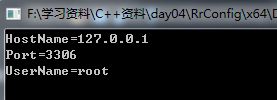C++ ini配置文件的格式及读写操作
C++ ini配置文件的格式及读写操作
1 为什么要使用ini或者其它(例如xml,json)配置文件?
如果我们程序没有任何配置文件时,这样的程序对外是全封闭的,一旦程序需要修改一些参数必须要修改程序代码本身并重新编译,这样很不好,所以要用配置文件,让程序发布后还能根据需要进行必要的配置;配置文件有很多如INI配置文件,XML配置文件,还有就是可以使用系统注册表等。注意:ini的后缀名也不一定是".ini"也可以是".cfg",".conf ”或者是".txt"。因为ini文件实质就是txt文本文件。
2 ini配置文件的格式
1、INI文件由节、键、值组成。
节:
[section]
参数(键=值)
name=value
注解
注解使用分号表示(;)。在分号后面的文字,直到该行结尾都全部为注解。
1)对节进行说明:
什么是sections ?
所有的parameters都是以sections为单位结合在一起的。所有的section名称都是独占一行,并且sections名字都被方括号包围着([ and ])。在section声明后的所有parameters都是属于该section。对于一个section没有明显的结束标志符,一个section的开始就是上一个section的结束,或者是end of the file。Sections一般情况下不能被nested,当然特殊情况下也可以实现sections的嵌套。
2)对参数进行说明:
INI所包含的最基本的“元素”就是parameter;每一个parameter都有一个name和一个value,name和value是由等号“=”隔开。name在等号的左边。
3)对注释内容进行说明:
在INI文件中注释语句是以分号“;”开始的(有些人定义类是由#注释,例如下面的RrConfig)。所有的所有的注释语句不管多长都是独占一行直到结束的,在分号和行结束符之间的所有内容都是被忽略的。
好了,以上就是ini配置文件的格式,是最简单的配置文件了。
3 C++读写ini配置文件
在VC中涉及的函数有如下四种。
1)读取字符串
DWORD GetPrivateProfileString(
LPCTSTR lpAppName, // INI文件中的一个字段名[节名]可以有很多个节名(配置文件的section名)
LPCTSTR lpKeyName, // lpAppName 下的一个键名,也就是里面具体的变量名(配置文件的key名)
LPCTSTR lpDefault, // 如果lpReturnedString为空,则把这个变量赋给lpReturnedString
LPTSTR lpReturnedString, // 存放键值的指针变量,用于接收INI文件中键值(数据)的接收缓冲区
DWORD nSize, // lpReturnedString的缓冲区大小
LPCTSTR lpFileName // INI文件的路径
);
2)读取整型值
UINT GetPrivateProfileInt(
LPCTSTR lpAppName, // INI文件中的一个字段名[节名]可以有很多个节名
LPCTSTR lpKeyName, // lpAppName 下的一个键名,也就是里面具体的变量名
INT nDefault, // 如果没有找到指定的数据返回,则把个变量值赋给返回值
LPCTSTR lpFileName // INI文件的路径
);
3)写入字符串
BOOL WritePrivateProfileString(
LPCTSTR lpAppName, // INI文件中的一个字段名[节名]可以有很多个节名
LPCTSTR lpKeyName, // lpAppName 下的一个键名,也就是里面具体的变量名
LPCTSTR lpString, // 键值,也就是数据
LPCTSTR lpFileName // INI文件的路径
);
4)写入整数值(没有相关函数,可以通过WritePrivateProfileString进行参数转换来实现)
4 代码示例
由于VC提供的函数部分功能比较少,一般解析配置文件都是调用库或者别人在项目中使用过的类,所以上面只是为了让大家了解ini的格式及相关参数的意义。下面的代码其实不需要看懂,只需要你会用即可。
ReConfig.h文件
#ifndef RR_CONFIG_H_
#define RR_CONFIG_H_
#include settings_;
std::map<std::string, std::map<std::string, std::string> >settings_;
};
}
#endif
ReConfig.cpp文件
#include "RrConfig.h"
#include 测试main.cpp
前提是首先在你想要的路径下配置一个.ini文件,我的是config.ini。
#include 5 总结
在测试的时候遇到了一个问题,其实之前很早也遇到过,就是如果打开的文件不带上.txt的话,文件无法打开,一直返回false,不知道你们是否会遇到这种问题,这里也是记录一下避免大家浪费时间。
看完这篇后,就能够帮你解决掉对ini配置的项目需求。
//bool ret = config.ReadConfig("config.ini");//error
bool ret = config.ReadConfig("config.ini.txt");
6 配置文件的解析库
1)libconfig, C++版本是libconfig++
libconfig第一篇———使用指南
http://blog.csdn.net/crazyhacking/article/details/9668981
2)C++的Json解析库:jsoncpp和boost .
http://www.cnblogs.com/lidabo/archive/2012/10/31/2748026.html
由于项目中暂时未对json要求,这里只是记录一下,以后有机会再玩玩。

